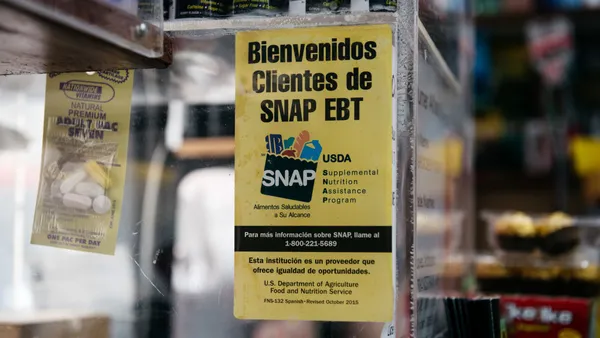Dive Brief:
- United Natural Foods, Inc. (UNFI) on Wednesday reported a sharp drop in profitability during its fiscal third quarter, as the grocery retailer and wholesaler’s net income and earnings per diluted share both sank more than 89% compared with the same period in 2022.
- Overall net sales during Q3, which ended April 29, were up 3.7% year-over-year in Q3, to $7.5 billion. Net sales in UNFI’s retail division registered a 0.7% decline, while net sales in the company’s supernatural division, which encompasses its sales to Whole Foods Market, jumped 12.2%.
- The dismal results compound an already difficult situation for UNFI, which shocked investors with an unexpected decline in profitability in the second quarter.
Dive Insight:
UNFI’s leadership is considering “every action” as the company works to get back on track after two “disappointing and frustrating” quarters, CEO Sandy Douglas said Wednesday during an earnings call.
The company remains weighed down by obstacles that have been hampering its forecasting ability as it weathers rocky macroeconomic conditions, Douglas said.
“Profitability and forecasting are where we have fallen short this year and where a great deal of our attention remains focused,” he noted during the call.
Douglas also said that UNFI continues to struggle to understand volatility in its business in part because of its 2018 acquisition of Supervalu — a transaction that he said “created a complex infrastructure partially related to the predecessor company’s respective long history of M&A.” Douglas pointed out that UNFI absorbed Supervalu before his arrival as CEO in 2021.
In addition, UNFI is still dealing with “vast operational complexities” brought on by the COVID-19 pandemic even as the worst effects of the pandemic have faded, Douglas said,
As it weathers continued uncertainty, UNFI lowered its financial guidance for the rest of its current fiscal year, which ends July 29. The company now expects net income to fall between $11 million and $41 million, down from the range of $90 million and $142 million it predicted in Q2, when it also lowered its expectations.
UNFI embarked on a multi-faceted “transformation agenda” in response to its rough second quarter, and Douglas said he is confident that changes it is implementing to improve its operations and cut costs will deliver results over the longer term.
Douglas alluded during the call to changes UNFI has made to its corporate leadership in recent months as it proceeds with that agenda. The adjustments have included the appointment of a new chief operating officer and a new president of wholesale. In addition, the former head of UNFI’s retail division, Mike Stigers, left the company in March and is now president of retailer-owned cooperative Wakefern Food Corp.
“Our management team, made up of experienced and knowledgeable industry leaders, alongside leaders with new skills and knowledge and experiences, are all focused on taking decisive action to improve the long-term health of our company,” Douglas said.
Those measures include looking for areas to cut expenses, such as making the company’s administrative structure leaner, as well as changes the company believes will add more than $100 million in “annualized operating margin benefits,” according to Douglas. The company also doesn’t intend to distribute bonuses this year, he added.
Douglas added that UNFI has made its private label operations one of the “top five focuses in the company” as it works to help its retail customers compete against larger retailers, which have also stepped up their emphasis on house brands to hold down costs for shoppers. In an effort to deliver the best possible value, UNFI has been concentrating on fewer brands, a move that has yielded “significant unit improvement,” said Douglas.
Douglas said that while UNFI confronts challenges that have sharply hurt its results, the company has made progress in its effort to use automation to strengthen its operations.
The company is preparing to install the first batch of artificial intelligence-driven technology it is procuring from robotics specialist Symbotic for its supply chain network at a distribution center in Centralia, Washington, and expects that the equipment will deliver “significant customer benefits and modest financial benefits” in fiscal 2024, he said.
Douglas said UNFI has also begun preliminary work to install robotics from Symbotic at two more of the five distribution centers where it intends to deploy gear from the automation company. UNFI plans to bring automation capabilities to additional facilities in its distribution center network, which includes 56 sites, Douglas added.













